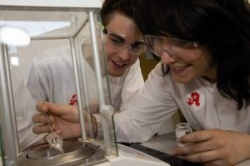How do you teach professionalism in pharmacy?
Students and teaching staff expressed difficulty in defining professionalism in pharmacy clearly and succintly. For most it seems to more an implicit than explicit concept, ie "you know it when you see it" according to a study undertaken in UK schools of pharmacy.

Professionalism teaching and learning needs to be integrated, grounded and longitudinal throughout all four years of the pharmacy curriculum says a research report published by the Pharmacy Practice Research Trust (PPRT). It should start from day one in year 1 and increase towards the more professional practice elements in years 3 and 4 of the MPharm course.
Professionalism in Pharmacy Education is the report of a research study headed by Dr Ellen Schafheutle, Lecturer in Law and Professionalism in Pharmacy, School of Pharmacy & Pharmaceutical Sciences, University of Manchester, UK. The study is one of three commissioned by the PPRT to investigate different areas of professionalism in pharmacy.
The study, which was conducted in three different UK schools of pharmacy, found that both staff and students expressed difficulty in defining professionalism in pharmacy clearly and succinctly. For most it seemed to be more of an implicit rather than explicit concept, ie “you know it when you see it”. Students, in particular, based their definitions and descriptions of professionalism on those applying, seen and experienced in practice. This was despite the relative lack of practice placements organised by the schools of pharmacy.
Evidence was found for the importance of role models, particularly those who are not only pharmacists but also retain a patient facing element. However, learning of professionalism is informed and influenced by many factors including practice experience often gained through part-time and vacation jobs. “Although this lies organisationally outside of the undergraduate degree, experiences around professionalism from these can still be incorporated into school teaching” the report says.
Dr Schafheutle said: "Although the pharmacy profession has a longstanding code of ethics in which principles of good practice are laid down, it is only just beginning to engage in open discussions about the role and application of professionalism or how this is learnt or developed. The main aim of this study was to understand and clarify how professionalism is learned, cultivated and facilitated in the academic environment. We found that a school’s overall culture, or organisational philosophy, is important, where high standards with regards to professionalism are set, taught and enacted. Explicit statements, policies and codes appear to be an important part to support the development of professionalism (and professional identify) and it is hoped that the recently published GPhC code of conduct for pharmacy students will go some way to setting standards.”
PPRT Trustee, Peter Curphey commented:“In order to nurture professional values and practice in pharmacy and create pharmacy leaders, it is important that we understand what aspects of professionalism in practice are valued by pharmacist, patient and the public alike. This is something that has not really been recognised or understood in the past. To investigate this, we identified the principles and practice of professionalism in pharmacy practice as a key research priority and established the Professionalism in Practice Grants Programme for research that relates to the teaching, assessment and practice of professionalism in pharmacy. This first study has made an important contribution to the understanding of how professionalism is incorporated and learnt in the MPharm curriculum.”
The report can be accessed at: www.pprt.org.uk/Publications/2010Publications.aspx
Picture Credit: obs/ABDA Bundesvgg. Dt. Apothekerverbände
05.11.2010











